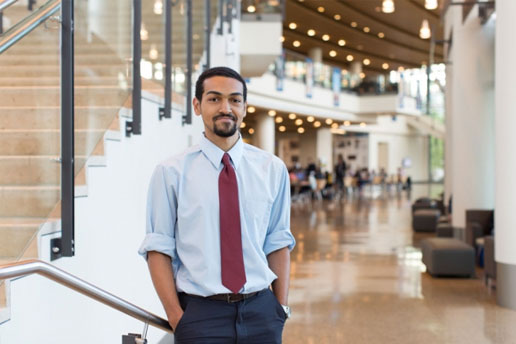
Meet Joseff Kolman. A junior majoring in both physics and political science, Kolman is the only MIT undergraduate joining three graduate students and numerous MIT faculty in attending this year’s United Nations Framework Convention on Climate Change’s Conference of Parties (COP21) in Paris. Kolman was chosen though a selective application process meant to provide the opportunity to an undergraduate student who would benefit from and share learnings from the climate negotiations. Thanks to donations benefitting undergraduate educational curricular and extracurricular activities, the MIT Energy Initiative (MITEI) was able to fund Kolman’s trip to attend the conference.
A background in music and an interest in science led Kolman to many new open doors at MIT. In his first year, he partook in the Terrascope program, in which he and 40 other MIT freshmen collaborated on solutions to help solve the global water security crisis. Terrascope was the catalyst to Kolman’s passion for sustainability and climate change relief. He later went on to participating in an Energy Undergraduate Research Opportunity Program (UROP) and serve on the MITEI Energy Education Task Force, which supports MITEI’s education program in assessing and enhancing the energy studies minor for undergraduates.
Over the past few weeks, Kolman was busy preparing for his trip. He considers the time leading up to the Paris talks a “process of contextualization where you get to hear from additional voices [about] the things people are looking forward to.” As part of his preparation, he has attended a class taught by Noelle E. Selin, the Esther and Harold E. Edgerton Career Development Associate Professor, in which students review the different negotiations that are expected to occur to achieve certain goals. Kolman’s preparations led him to the realization that “there is a potential for the world to put the issues into better focus again in a way such that there’s a renewed international momentum which can push policies forward.”
There certainly does seem to be a renewed momentum in the world to face these issues. Years after some of the most highly-polluting nations (including the U.S.) failed to agree to cut emissions under the Kyoto Protocol — the first international agreement to reduce greenhouse gases — the world has seen multiple measures from the Obama administration’s to develop and enact climate policies, a cap-and-trade system from China on carbon emissions, as well as numerous other efforts from individual nations. These efforts, combined with the rate at which technology is advancing, have also made renewable energy more affordable to deploy and more accessible to the general public. It seems people are finally ready to talk about the different approaches to a globally enforceable legislation to combat climate change and this has instilled hope in Kolman. “It’s been fantastic witnessing technological growth along with the political progress that we’ve been seeing,” he says.
Kolman realizes, however, that hope alone will not be enough. Two pressing issues he expects COP21 to address are accountability for the history of carbon emissions and power pricing schemes that include methods to incentivize and finance current power plants to adapt to renewables.
Aside from attending the talks themselves, this trip offers Kolman an opportunity to prepare for his future. He says, “I am sure that I will meet people at the talks and think that 10 years from now the two of us will be in positions where we will need to contact each other to solve big problems.” That’s because Kolman plans for a career dedicated to the adoption of smart policies that help the world achieve a sustainable future. Attending COP21 provides him with a head start in creating connections with and learning from informed delegations around the world.
On a smaller scale, Kolman looks forward to making the same connections with the graduate students on the MIT delegation. Being with other MIT students creates a ”very comfortable medium through which I can pick their brains about their views on with the way things are moving forward, with things they’ve done in the past, and see what the people of MIT are thinking inside this space” he says.
Joseff Kolman will also serve as a correspondent for MITEI on the proceedings of the conference. He plans for his coverage to mirror the way he internalizes things, going into the conference “with a mindset that these are the big problems that we’re trying to solve, and observing the different individual actions that are occurring and the even greater impacts these actions can have when coordinated and combined.”
This article appears in the Spring 2016 issue of Energy Futures.